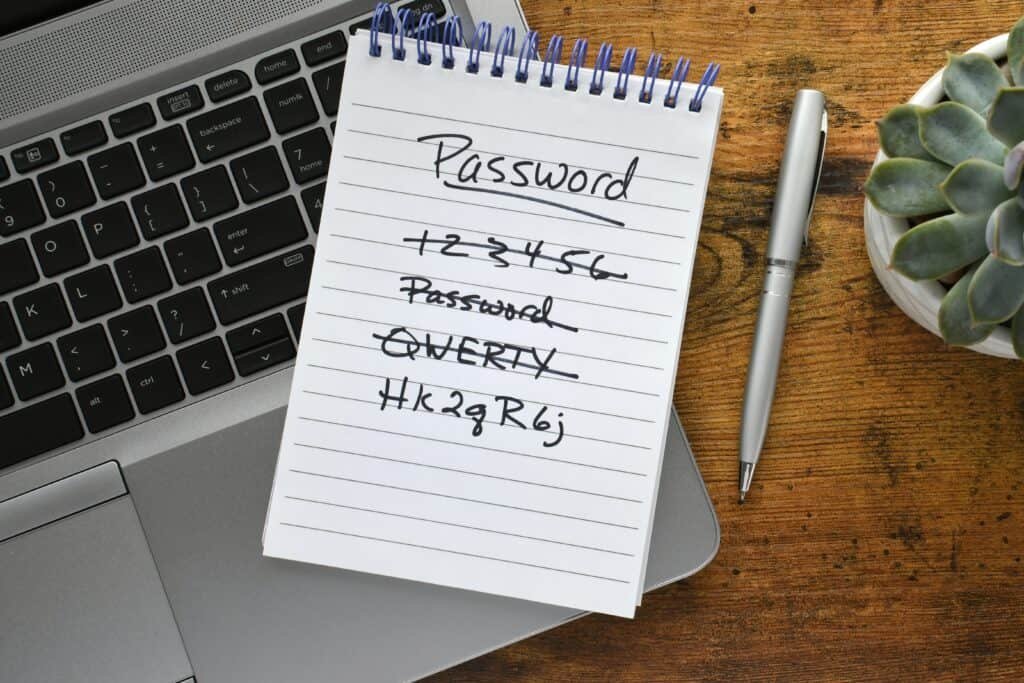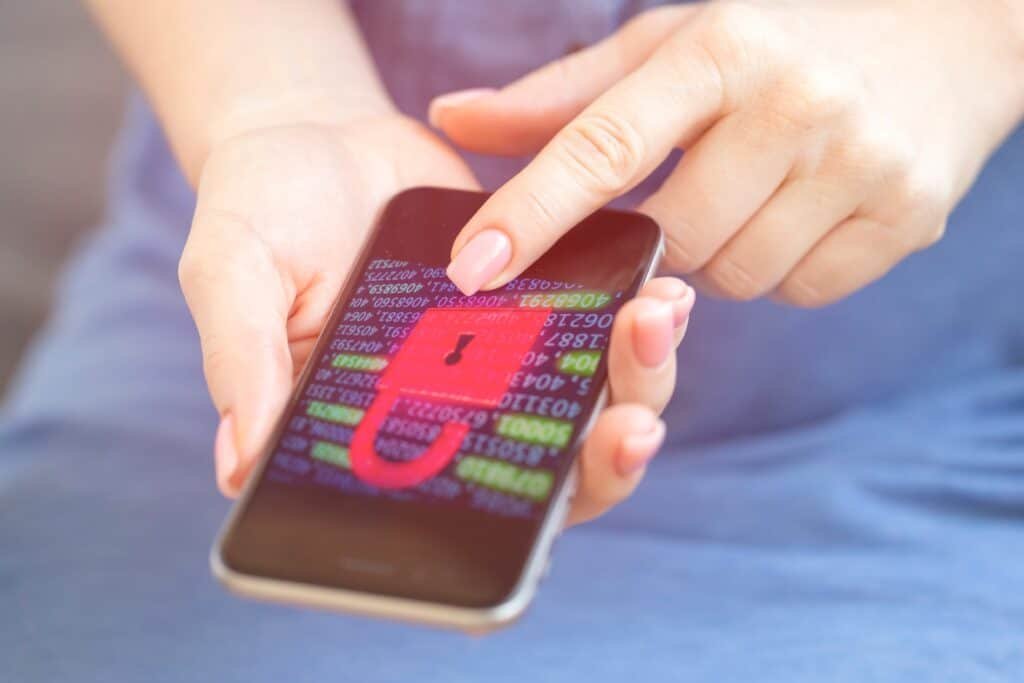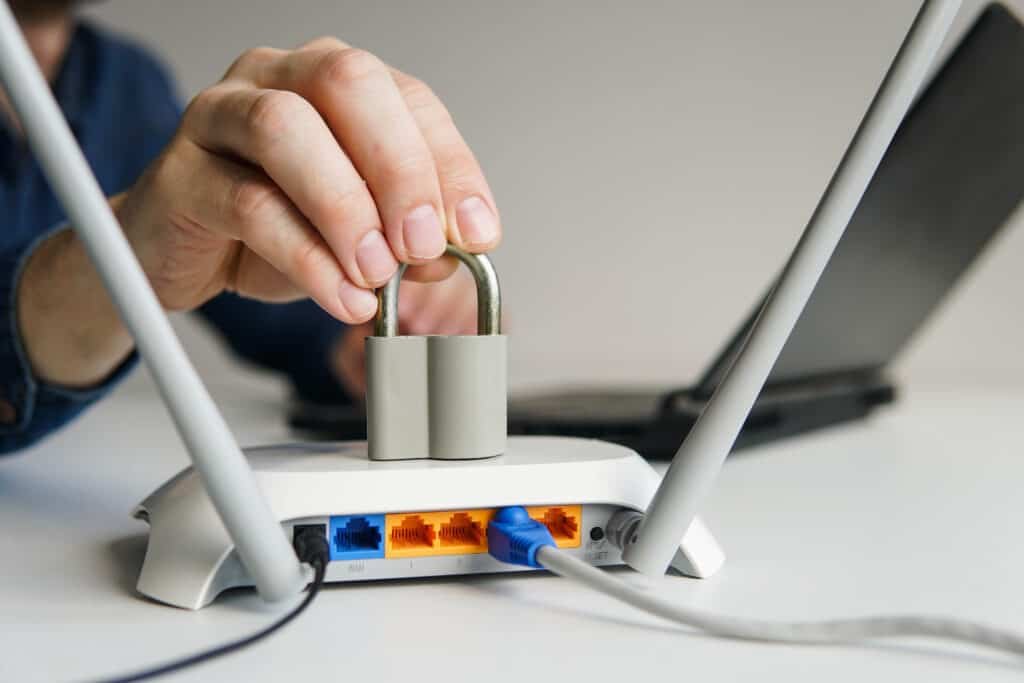10 Easy Ways to Improve Your Online Security Now

We may earn a small fee from the companies mentioned in this post.
Imagine receiving a notification that your email account has been hacked, or worse, your bank account has been compromised. The feeling of vulnerability and panic can be overwhelming, but what if you could easily prevent such a situation by taking simple steps to improve your online security? In today’s digital world, it’s crucial to prioritise your online safety and protect your valuable data. In this blog post, we will discuss “10 easy ways to improve your online security” and minimise the risk of falling victim to cyber threats.
From password management to recognising phishing scams, these tips will provide you with the tools and knowledge needed to safeguard your digital life. Let’s dive in and explore how you can take control of your online connectivity by implementing these 10 easy ways to improve your Internet security.
Short Summary – Improve your online security
Utilise a password manager and strengthen passwords for online safety.
Implement multi-factor authentication, manage app permissions & secure Wi-Fi connection.
Educate yourself on phishing scams and maintain device security to protect personal data.
1. Utilise a Password Manager

One of the most effective ways to enhance your online security is by using password managers. These software applications not only offer secure storage and management of passwords for various online accounts, but they can also generate strong, unique passwords and automatically fill in login credentials. By utilising a password manager, you reduce the risk of data breaches and increase productivity.
When selecting a password manager, it’s important to evaluate the features it offers, such as password generation, autofill, and password protection. Additionally, consider the security measures implemented by the password manager, including encryption and data backups. A reliable password manager will provide you with peace of mind and a more secure online experience.
Discover the best Password Manager with this informative aricle
2. Strengthen Your Passwords

Using strong, unique passwords for each of your online accounts is essential in protecting your personal data and connections. A recommended password should be at least 12 characters long and contain a combination of upper and lowercase letters, numbers, and symbols.
Avoid using the same password for multiple accounts. Utilising a password manager, as mentioned earlier, can help you create and remember these complex passwords, while also providing a secure master password to access them all.
For your valuable accounts, such as email and banking, it’s crucial to use strong, unique passwords to protect any sensitive information they may contain. Additionally, using strong passwords on secure websites can further enhance your online safety.
Don’t forget about your mobile devices. Utilising passcodes or strong passwords on smartphones is essential for safeguarding personal data and maintaining overall online safety. By strengthening your passwords across all devices and accounts, you create a solid defence against potential cyber-attacks.
Read our blog on how to create a good password
3. Implement Multi-Factor Authentication
An extra layer of security can be achieved by implementing multi-factor authentication (MFA) for your online accounts. MFA requires two-step verification of your identity. This can be done through three different ways; something you are, such as a fingerprint, something you have, like an ID card, or something you know, like a password. This process makes it significantly harder for unauthorised users to access your accounts since a password alone is not enough.
Gmail, Evernote and Dropbox are among many services which offer multi-factor authentication to improve security. This extra feature adds an important layer of protection to user accounts. By taking advantage of MFA, you can significantly reduce the likelihood of data breaches and unauthorised access to your accounts.
4. Safeguard Your Email and Mobile Devices

Protecting your email accounts and mobile devices is a crucial aspect of online security. One way to safeguard your email is by using two separate email accounts: one for personal use and another for online services and communications. This separation helps minimize the risk of unauthorised access to your primary email address, which often contains sensitive information.
Another important measure is to keep your primary email address and phone number private, using separate addresses and numbers for non-essential communications when possible. This reduces the risk of unwanted access and potential identity theft.
Lastly, consider disabling lock screen notifications on your mobile devices to protect your privacy and reduce the risk of online threats. By taking these precautions, you can ensure your email and mobile devices remain secure and your personal information stays protected.
Checkout our informative article on what a cyber attack means
5. Install and Update Antivirus Software
Antivirus software plays a vital role in protecting your devices’ operating system against various forms of malicious software, such as computer viruses, ransomware, and Trojan horse programmes. By installing and updating antivirus software, you can detect and remove viruses and malicious programme code, as well as prevent unauthorised parties from monitoring your activities and actions.
It’s important to ensure that you have antivirus software installed on your Windows PC, and that it’s up-to-date. Registering for automatic renewal is a recommended way to keep your antivirus software current and effective.
When it comes to web browsing, some browsers, such as Microsoft Edge and Internet Explorer, are more compatible with built-in antivirus software like Windows Defender. Ensuring that your antivirus software and browser are properly configured and updated will provide you with a safer online experience.
Our blog on how to prevent viruses on your computer maybe provide useful information.
6. Be Cautious with Online Sharing

Online sharing of personal information, photos, videos, and other data can result in identity theft, data breach, and other security risks. To minimise these risks, it’s essential to exercise caution when sharing information online. Here are some steps you can take to protect your privacy.
Adjust your social media privacy settings to limit the visibility of your personal information.
Avoid oversharing details such as your home address, date of birth, or the school your children attend.
Refrain from tagging yourself in photos or videos that reveal your location or other sensitive information.
By following these guidelines, you can help ensure that your personal information remains secure.
Another important aspect of online sharing is geotracking. Limit the geotracking capabilities of your devices and social media accounts to prevent unwanted access to your location data. By being cautious with online sharing, you can protect your personal information and minimise the risk of potential threats.
7. Manage App Permissions and Browser Extensions

Controlling the permissions of your mobile apps and browser extensions is crucial for maintaining your privacy and security. Regularly review the permissions for each app, and make adjustments as needed to prevent unwanted access to your personal data.
When prompted by mobile applications, such as messaging apps, requesting permission to access certain features, it’s advisable to decline such requests, either from within the app or through your device’s settings menu. Some common permissions to be cautious of include:
Contacts
Files
Camera
Microphone
Location
Regularly reviewing individual app permissions ensures that you are not unintentionally disclosing more information than necessary.
By managing app permissions and browser extensions, you maintain control over your digital privacy.
8. Secure Your Wi-Fi Connection

A secure Wi-Fi connection is essential for maintaining your online security. One way to enhance the security of your Wi-Fi connection is by using a Virtual Private Network (VPN) when connecting to public networks. VPNs encrypt your data and protect it from unauthorised access on public Wi-Fi networks.
A VPN creates a private Internet link (often refereed to as a tunnel) between your device (like your computer or phone) and the website you’re visiting. It hides your data from other people on the internet, making it much harder for anyone to see what you’re doing online or steal your information.
In addition to using a VPN, consider encrypting your data and safeguarding your home internet connection. By taking these steps, you can protect your sensitive data and minimize the risk of online security breaches.
Checkout our informative blog on the 7 types of cyber security threats
9. Educate Yourself on Phishing Scams
Phishing is a malicious activity where hackers create deceptive websites or messages to steal personal information from unsuspecting victims. To protect yourself from phishing scams, it’s essential to educate yourself on how to identify suspicious emails, links, and messages. Some common signs of phishing emails include misspellings, grammatical errors, and requests for personal information or login credentials.
If you’re unsure about the authenticity of a communication, verify it by contacting trusted sources in your address book via phone or email, without using the contact details provided in the suspicious communication. When it comes to web links, it’s important to be mindful. Hover your mouse cursor over them to know where they propose to send you. Avoid clicking on those that direct you to unfamiliar sources.
By educating yourself on phishing scams and staying vigilant, you can protect your personal information and avoid falling victim to these malicious attempts.
Check out our article on the best ways to protect against phishing scams
10. Maintain Device Security
Ensuring the security of your devices is an integral part of protecting against a wide range of threats. Utilising strong passcodes or passwords, as well as biometric authentication when possible, can prevent unauthorised access and enhance device security.
Another important aspect of device security is regularly clearing your browser cache. Browser cache is a place on your computer where your web browser stores data from websites that you visit.
The main purpose of a browser cache is to make web browsing faster. When you visit a website, your browser downloads various elements of the webpage to display it on your screen. If you visit the same website again, your browser can load the data from the cache instead of downloading it all over again from the internet. This can make the website load faster and also save on your internet data usage.
However, the cache can sometimes cause issues. For example, if a website updates its content but your browser loads the old data from the cache, you might not see the most recent version of the website. In such cases, you might need to clear your browser cache to ensure you’re seeing the most up-to-date content.
This not only helps safeguard your device from malicious software and potential risks, but can also improve your device’s performance. By maintaining your device security, you create a safer online environment for yourself and your personal data.
Checkout our informative article on ‘What a cyber attack means’
Summary
In conclusion, online security is not just a necessity but a responsibility in our increasingly digital world. As we continue to share more of our lives online, the potential for cyber threats only grows. However, by implementing the 10 easy steps outlined in this blog, you can significantly bolster your online security.
Remember, the key to online security is vigilance and proactive measures. From creating strong, unique passwords to enabling two-factor authentication, from securing your Wi-Fi network to staying updated on the latest software, each step plays a crucial role in your overall online safety.
Moreover, it’s important to stay informed about the latest online threats and how to counter them. Utilise resources like Cyber Aware, Get Safe Online, and Action Fraud to stay updated on the latest in cybersecurity.
Finally, remember that online security is a continuous process, not a one-time task. Regularly review your security practices, update your knowledge, and make necessary adjustments to your online habits.
By taking these steps, you can navigate the digital world with confidence, knowing that you’ve done your part to protect your online presence and enjoy the peace of mind that comes with knowing you’re well-protected in the digital world.
Frequently Asked Questions
What are the 15 tips to stay safe online?
1. Use strong and unique passwords for all your online accounts.
2. Enable two-factor authentication whenever possible.
3. Keep your devices and software up to date with the latest security patches.
4. Be cautious when clicking on links or downloading attachments from unknown sources.
5. Use a reliable antivirus software and keep it updated.
6. Be mindful of the information you share online, especially on social media platforms.
7. Avoid using public Wi-Fi for sensitive activities like online banking or shopping.
8. Regularly back up your important files and data.
9. Use a virtual private network (VPN) when accessing the internet on public networks.
10. Be wary of phishing attempts and never share personal or financial information via email or unfamiliar websites.
11. Only download apps from trusted sources, such as official app stores.
12. Regularly review and adjust your privacy settings on social media and other online platforms.
13. Avoid oversharing personal information on public forums or websites.
14. Educate yourself about common online scams and frauds to avoid falling victim to them.
15. Trust your instincts and practice caution when interacting with unknown individuals or websites online.
How can you improve online security?
To improve your online security, it is important to use a strong and separate password, install the latest software and app updates, turn on 2-step verification, use a password manager and back up your data.
Furthermore, you can consider using three random words as an additional layer of protection.
What is a password manager and how does it enhance online security?
Password managers are software tools that securely store and manage passwords for different online accounts. They enable users to create strong, unique passwords for each account and automatically fill in login credentials, so as to enhance online security while minimizing the risk of data breaches.
Password managers are becoming increasingly popular as more people become aware of the importance of online security. They provide a convenient way to store and manage passwords, as well as other information.
How can I create strong, unique passwords for my online accounts?
Creating strong, unique passwords is essential for keeping your online accounts secure. Use a combination of at least 12 characters with uppercase and lowercase letters, numbers, and symbols to keep your accounts safe.
A password manager can be helpful for this task.
What is multi-factor authentication and why is it important?
Multi-factor authentication (MFA) provides an extra layer of security by combining two or more independent methods of identification, such as something you are (e.g., biometrics), something you have (e.g., a code sent to your phone) and something you know (e.g., a password).
By making it harder for malicious actors to gain access to your accounts and personal data, MFA is essential for protecting yourself online.
External Reference Sites
- Cyber Aware: This is a website run by the UK’s National Cyber Security Centre. It provides advice on how to stay secure online, such as using a strong and different password for your email, and turning on 2-Step Verification (2SV) for your email. It also provides guidance on how to change your email password and set up 2SV for your email on various platforms.
- Action Fraud: Action Fraud is the UK’s national reporting centre for fraud and cybercrime. It’s the place where you should report fraud if you have been scammed, defrauded, or experienced cybercrime. The website also provides news and alerts about recent fraud cases and scams to help you stay informed and protected.
With over three decades of experience in the heart of London’s financial sector, I have dedicated my career to the pursuit of robust cybersecurity practices and IT leadership. As a Certified Information Systems Security Professional (CISSP), Certified Information Security Manager (CISM), Certified Chief Information Security Officer (C|CISO), Certified Ethical Hacker (CEH), and Computer Hacking Forensic Investigator (CHFI), I bring a wealth of knowledge and expertise to the table.
My journey in the field of cybersecurity has not only been about personal growth but also about sharing my insights with others. As an international speaker, I have had the privilege of addressing audiences worldwide, discussing the importance of cybersecurity in today’s digital age. My passion for knowledge sharing extends to my work as an author and blogger, where I delve into the complexities of cybersecurity, offering practical advice and thought leadership.
In my role as a CISO and Head of IT, I have overseen the development and implementation of comprehensive information security and IT strategies. My focus has always been on creating resilient systems capable of withstanding the evolving landscape of cyber threats.
My Master’s degree in Cybersecurity has provided a solid academic foundation, which, when combined with my practical experience, allows me to approach cybersecurity from a holistic perspective.
I am always open to connecting with other professionals in the field, sharing knowledge, and exploring new opportunities. Let’s secure the digital world together.

